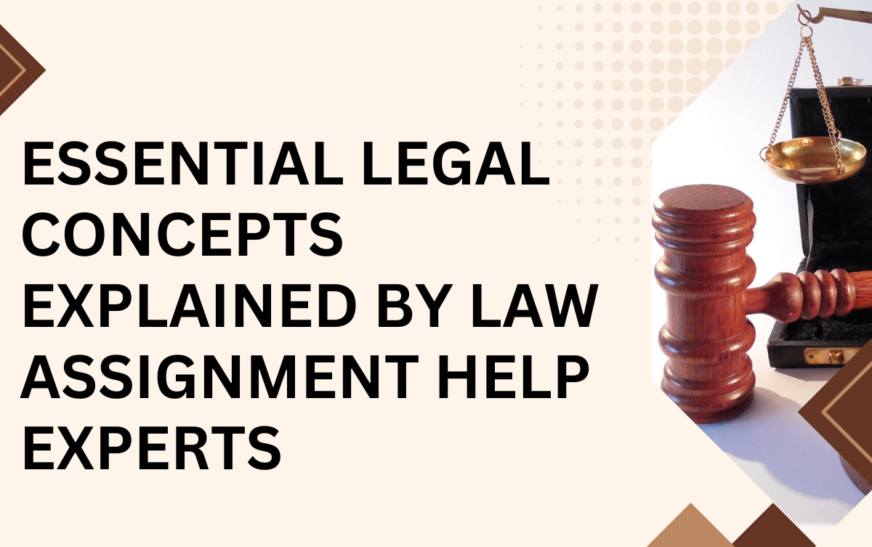Understanding legal concepts can be a challenging task, especially for students who are new to the field of law. The complexity of legal principles, the vast number of case laws, and the constant evolution of legal systems make law assignments quite demanding. However, with the assistance of Law Assignment Help experts, students can grasp these concepts effectively and apply them in their assignments. This blog explores some essential legal concepts, providing a fundamental understanding for law students and enthusiasts.
1. Rule of Law
The Rule of Law is one of the foundational principles of a democratic society. It signifies that everyone, regardless of status or power, is subject to the law. No one is above the law, and the law should be applied fairly and consistently. The principle promotes justice, accountability, and protection against arbitrary governance.
Key Aspects of the Rule of Law:
- Laws must be clear, publicized, and stable.
- The judiciary must be independent and impartial.
- Legal processes must be transparent and accessible.
- Citizens should have access to legal remedies in case of rights violations.
Example Case:
Marbury v. Madison (1803) is a landmark case in the United States that reinforced the principle of judicial review, ensuring that laws are subject to constitutional scrutiny.
2. The Doctrine of Precedent
The Doctrine of Precedent, also known as stare decisis, is a fundamental principle in common law systems. It means that courts must follow previous judicial decisions when similar issues arise.
Types of Precedents:
- Binding Precedent – Courts must follow decisions made by higher courts in the same jurisdiction.
- Persuasive Precedent – Decisions from other jurisdictions or lower courts that may influence a ruling but are not mandatory.
Importance in Law Assignments:
Law students must analyze past case laws, interpret judgments, and apply them to contemporary legal problems. Law Assignment Help services often assist students in understanding how to cite and use precedents effectively.
3. Legal Rights and Duties
Every legal system is based on rights and duties. Legal rights are privileges granted by the law, while legal duties are obligations imposed by the law.
Types of Legal Rights:
- Civil Rights – Freedom of speech, right to privacy.
- Political Rights – Right to vote, right to run for public office.
- Social Rights – Right to education, right to healthcare.
- Economic Rights – Right to fair wages, right to property.
Example:
The Universal Declaration of Human Rights (UDHR) outlines fundamental human rights that all individuals are entitled to, regardless of nationality.
4. Contract Law: The Basics
Contract law governs agreements between individuals or businesses and ensures that obligations are legally enforceable.
Elements of a Valid Contract:
- Offer – One party proposes terms.
- Acceptance – The other party agrees to the terms.
- Consideration – Something of value is exchanged.
- Intention to Create Legal Relations – Both parties intend to be legally bound.
- Capacity – Parties must have the legal ability to enter into a contract.
- Legality – The contract must be for a legal purpose.
Breach of Contract:
If a party fails to fulfill their contractual obligations, the aggrieved party can seek remedies such as damages, specific performance, or rescission of the contract.
5. Criminal Law vs. Civil Law
Legal disputes can generally be categorized into criminal law and civil law cases.
Criminal Law:
- Deals with offenses against society.
- The government prosecutes the accused.
- Punishments include imprisonment, fines, or community service.
- Example: R v. Dudley and Stephens (1884) – A famous criminal law case involving necessity as a defense.
Civil Law:
- Deals with disputes between individuals or entities.
- Compensation is sought rather than punishment.
- Example: Donoghue v. Stevenson (1932) – Established the modern concept of negligence in civil law.
Understanding this distinction is crucial for law students, and Law Assignment Help experts provide detailed case studies and explanations to make these concepts clearer.
6. Tort Law: Liability and Negligence
Tort law covers civil wrongs that cause harm or loss to individuals.
Types of Torts:
- Intentional Torts – Assault, battery, defamation.
- Negligence – Failure to exercise reasonable care.
- Strict Liability – Liability without fault (e.g., defective products).
Key Case:
Donoghue v. Stevenson (1932) – Established the duty of care principle in negligence cases.
7. The Principle of Natural Justice
Natural justice ensures fairness in legal proceedings. The two fundamental principles are:
- Nemo judex in causa sua – No one should be a judge in their own case.
- Audi alteram partem – Both sides should be heard before a decision is made.
These principles ensure that legal proceedings are unbiased and just.
Conclusion
Understanding fundamental legal concepts is crucial for law students and professionals alike. Principles like the Rule of Law, Precedent, Legal Rights, and Contract Law form the foundation of legal studies. With the support of Law Assignment Help experts, students can navigate the complexities of law with ease, ensuring academic success and a strong grasp of legal principles.
If you need assistance with legal concepts, case law analysis, or structured assignments, expert guidance is available to help you achieve your academic goals!
FREQUENTLY ASKED QUESTIONS
1. What is the importance of precedents in legal studies?
Precedents serve as a guide for courts to ensure consistency and predictability in legal decisions. Law students must study past cases to understand how judges interpret laws and apply them in various contexts.
2. How can Law Assignment Help assist students in understanding legal principles?
Law Assignment Help provides expert guidance, case law analysis, and well-structured solutions, making it easier for students to grasp complex legal concepts and excel in their assignments.
3. What are the key differences between criminal law and civil law?
Criminal law deals with crimes against the state and includes punishments like imprisonment. Civil law involves disputes between individuals or organizations, focusing on compensation rather than punishment.
4. Why is contract law essential in business and daily life?
Contract law ensures that agreements between parties are legally enforceable, providing security in business transactions and personal agreements.
5. What is the role of natural justice in legal proceedings?
Natural justice ensures fairness, impartiality, and transparency in legal processes, preventing bias and safeguarding individuals’ rights.
READ MORE BLOG:- https://guestpostsubmission.com/










2 Comments
[…] media has become a go-to resource for people seeking legal help. Here’s why it’s essential for your […]
[…] you are considering a mutual divorce, consulting a legal professional for guidance on documentation and procedures can help streamline the […]
Comments are closed.